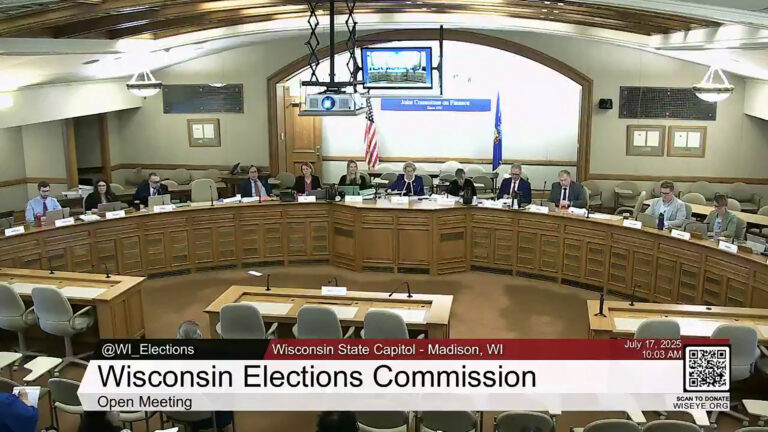Wisconsin's Senate race could determine control of Congress
The midterm elections are less than a month away and a small handful of states will be critical in deciding the balance of the Senate. One of those states is Wisconsin, where Democratic Lt. Gov. Mandela Barnes is looking to unseat Republican incumbent Sen. Ron Johnson who has a slight lead in the latest polls.
PBS News Hour
October 14, 2022

VIDEO TRANSCRIPT
Amna Nawaz:
Well, the 2022 midterm elections are less than one month away, and a handful of states will be critical in deciding the balance of the U.S. Senate.
One of those states is Wisconsin, where Democratic Lieutenant Governor Mandela Barnes is looking to unseat the Republican incumbent, Senator Ron Johnson, who has a slight lead in the latest polls. The two candidates face off in their second debate tonight. Judy
Woodruff recently visited the Badger State and has this report.
Judy Woodruff:
In Wisconsin's Columbia County, about an hour north of Madison, neighbors Rick Donovan and Peter Grimm have plenty in common.
Rick Donovan, Wisconsin voter:
OK, fetch.
Judy Woodruff:
They're both avid hunters. They're both Catholic. They even grew up within minutes of each other in Milwaukee. But when it comes to politics, and specifically this year's U.S. Senate election, these friends of almost a decade disagree.
Peter Grimm, Wisconsin voter:
Ron Johnson has just been rubber stamp Republican policies. Mandela Barnes at least is talking about unifying the state, talking about working for every city in the state, every person. And I like that message a lot more.
Rick Donovan:
I tend to worry about some of the things with Barnes more than that the other end with Johnson. I worry about safety in our country.
Judy Woodruff:
The Republican incumbent, Ron Johnson, a 67-year-old Oshkosh businessman, is seeking his third term in the Senate. His Democratic challenger, 35-year-old Mandela Barnes, is Wisconsin's Milwaukee-born lieutenant governor and a former community organizer.
Barry Burden, University of Wisconsin-Madison:
Barnes and Johnson are about as different as you could get in terms of their personal backgrounds, their life experience, their position on the issues.
Judy Woodruff:
Barry Burden is a political science professor at the University of Wisconsin-Madison. He says interest in this Senate race isn't necessarily about enthusiasm for either candidate.
Barry Burden:
I think it's fear about the other side winning. Democrats are so eager to have Ron Johnson out of office. They have seen him move in a more radical direction and in favor of the kind of style of governing that Trump was engaged in.
Barnes is, I think, raising concern among Republicans who don't want to see what they view as a radical agenda come to Washington.
Judy Woodruff:
Wisconsin is often described as a purple state, with the results shifting from Republican to Democratic from election to election. But, in reality, you might say it's more of a tapestry in red and blue, with urban areas, like the capital city here, Madison, voting predominantly Democratic, the rest of the state essentially Republican.
And with these midterm elections drawing closer, voters tell us they feel the divisions are growing even deeper.
Barry Burden:
In a state like Wisconsin, there aren't many undecided voters. The swing voters or split-ticket voters probably amount to less than 10 percent of the people who will participate this fall.
So, the campaigns maybe view that as a riskier strategy to try to win over those people. And they would rather generate excitement or enthusiasm or fear from their own supporters and use that to get to the votes they need to win.
Judy Woodruff:
With that strategy has come tens of millions of dollars in campaign spending, much of it from outside groups and an onslaught of negative advertisements.
Narrator:
Johnson even supported a CEO in Oshkosh who's taking 1,000 new jobs to South Carolina. When asked why, Johnson said Wisconsin "has enough jobs."
Narrator:
Barnes wanted to abolish ICE, open our borders to illegal immigrants, and release violent felons without bail. Mandela Barnes, dangerously liberal on crime.
Judy Woodruff:
Johnson attacked Barnes over rising crime during the candidates' first debate last week in Milwaukee.
Sen. Ron Johnson (R-WI):
That he has a record of wanting to defund the police. Now, I know he doesn't necessarily say that word. But he has a long history of being supported by people that are leading the effort to defund. He uses code words like reallocate, overbloated police budgets. He says it pains him to see fully funded police budgets.
Judy Woodruff:
Barnes responded to that criticism when we spoke at a Milwaukee campaign stop.
Lt. Gov. Mandela Barnes (D-WI), senatorial candidate:
It's important that we make sure communities have the resources they need to prevent crime from happening in the first place. And Ron Johnson should be so bold as to talk about crime, when he voted against the American Rescue Plan.
Our administration invested $100 million into law enforcement, public safety and crime prevention initiatives. And Ron Johnson voted against it, because he'd rather play politics and do the right thing to keep people safe.
Judy Woodruff:
Meanwhile, Barnes and Democrats nationwide have made abortion a centerpiece of their campaigns following the Supreme Court's overturning of Roe v. Wade.
Lt. Gov. Mandela Barnes:
We're going to hold Ron Johnson accountable for his dangerous record on abortion. He celebrated the Dobbs decision. He said it was correctly decided. He said that, if women don't like the laws in their state, like our 1849 criminal abortion ban, they can just move.
It's callous. It's out of touch.
Judy Woodruff:
Johnson's campaign did not respond to our repeated requests for an interview or information about his public schedule.
On abortion, Johnson says he wants voters to weigh in through a referendum and he's tried to redirect attention to the economy.
Sen. Ron Johnson:
We have added $7.5 trillion of new deficits over just the last three years. That is the greatest threat. That is what has also sparked inflation, 40-year high inflation. Do you realize that a dollar you held at the start of the Biden administration is only worth 88.3 cents?
Judy Woodruff:
Johnson supporter Michelle Hoppe, who lives near Madison, says inflation is critical.
Michelle Hoppe, Ron Johnson supporter:
People are feeling it, and they are hurting. And it is a direct result of overspending and overstimulating an economy that they didn't need to do. That is what creates inflation is all of this unnecessary spending. It's got to stop.
Judy Woodruff:
While Milwaukee's Sydney Lee says what's driving her vote is a fear her rights would be threatened if Johnson wins reelection.
Sydney Lee, Mandela Barnes supporter:
I want to make sure that we have abortion access, because reproductive rights are human rights. And everybody needs access to them. So I want to make sure that we get somebody in office who's going to do what they need to do to make sure that rights are protected and people are protected.
Judy Woodruff:
But the University of Wisconsin's Barry Burden says abortion has fallen some as an issue, as almost four months have passed since the Roe decision. He also says Barnes has been hurt by Republican attacks over crime.
Barry Burden:
There hasn't been much in the way of a full-throated defense from Barnes. He has said mainly that Johnson and his allies have distorted his positions on crime and on ICE and policing and all of those related issues. But he hasn't really put together a clear proactive message about what he would do about police violence or criminal justice more generally.
Judy Woodruff:
At the same time, Burden says Johnson's potential vulnerabilities, like his actions around January 6 and ties to former President Trump, have gotten relatively little attention.
Put all this together, and Democrats are concerned, even in this effectively tied race, where fear seems to be driving voters on both sides, like Columbia county neighbors Peter Grimm and Rick Donovan.
Rick Donovan:
I just don't trust what will happen with Barnes. I think he will ignite a lot of things.
Judy Woodruff:
Do you think people are less safe if Barnes is elected to the Senate?
Rick Donovan:
I believe so.
Peter Grimm:
I just know the Republicans, they have done so much too far to the right. I'm afraid of them. I'm afraid that they will hurt me.
Judy Woodruff:
Grimm and Donovan say they still try to keep their friendship above politics. But, as Election Day nears, they wish others in this fiercely divided state could do the same.
 Passport
Passport











Follow Us